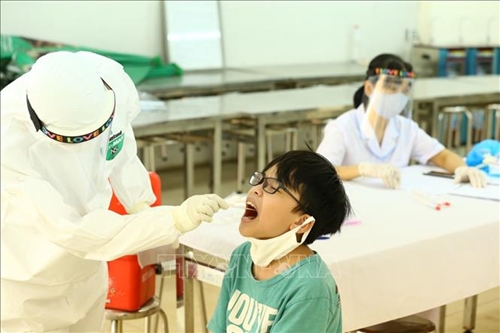In the first stage lasting 44 days from January 22 to March 5, since the first cases recorded in the country to the 16th patient, 3,094 specimens were processed, translating to a daily capacity of merely 70 tests.
The second phase lasting 47 days from March 6 to April 22, 182,109 specimens were processed, equivalent to 3,874 samples a day.
    |
 |
|
Taking samples for COVID-19 testing |
This period marked the ‘second wave’ of coronavirus infections in Vietnam, with many imported cases and subsequent closure of borders on March 22, after a brief two weeks with no reported cases since the 16th case.
The third phase, lasting 91 days, from April 23 to July 23, a total of 237,815 specimens were processed, translating to handling of 16,173 specimens a day.
This was within the period of Vietnam’s 99 days of no recorded community infections and only imported cases, a streak that ended on July 25 when Patient 416 was confirmed in Da Nang, leading to the discovery of several hundred local infections connected to this outbreak in the coastal city.
From July 24 to August 24, the national daily capacity jumped to 16,173 specimens a day, with more than 485,215 specimens processed within a span of 30 days.
By 3pm on August 28, Vietnam has performed a total of 1,009,145 tests using RT-PCR technique, according to the Department of Preventive Medicine under the Ministry of Health.
The ministry noted that the number of COVID-19 tests performed within the past month alone reached the same as the amount carried out in the first six months into the pandemic, given the spread of the virus into the community which demanded quick testing on a larger scale of the population to properly carry out the strategy of quickly identifying, isolating cases, tracing their close contacts and eventually suppressing the outbreaks.
Vietnam currently has 71 facilities that can perform confirmatory COVID-19 tests, capable of conducting a total of 34,000 tests a day.
On August 20, the health ministry sent an urgent notice to all State-managed hospitals and health centers to increase SARS-CoV-2 screenings to early detect COVID-19 cases in a bid to reduce risks of the virus infiltration into wards where patients are in poor health, which happened in Da Nang, resulting in the majority of related deaths.
Source: VNA